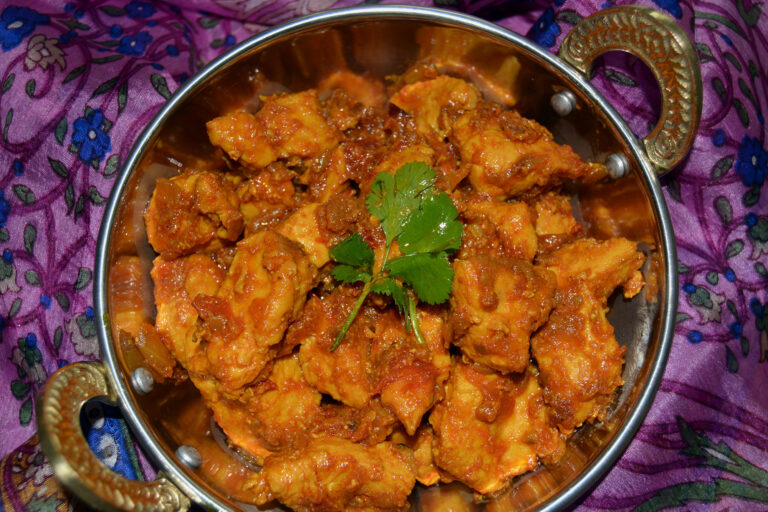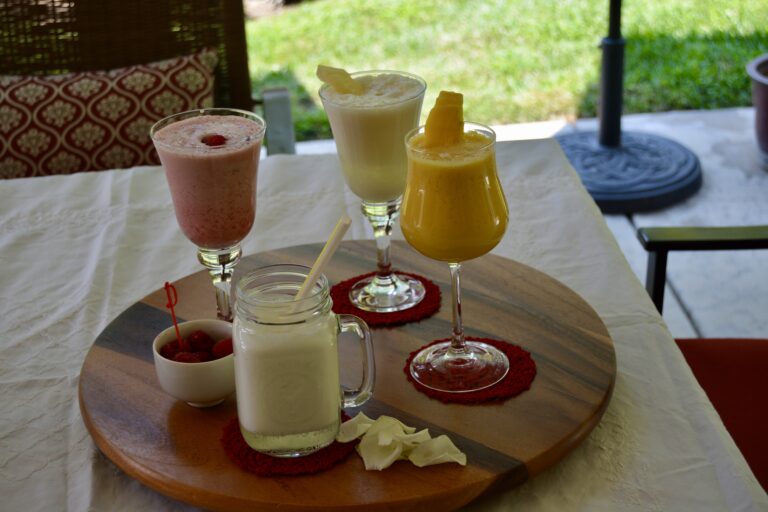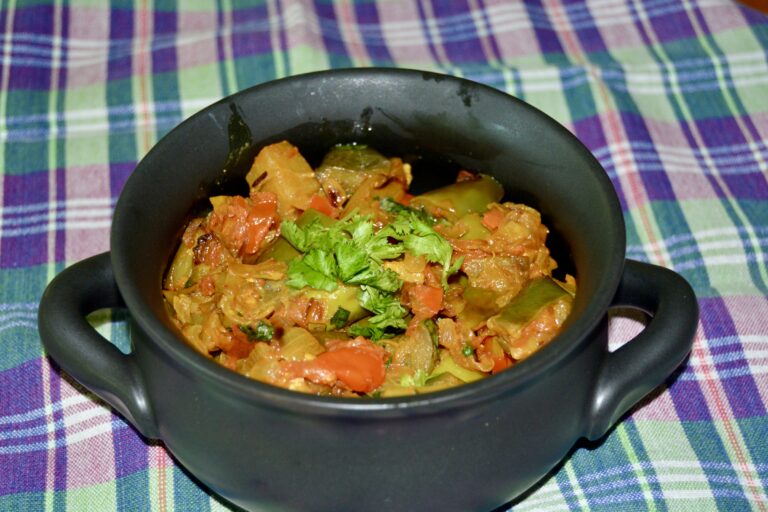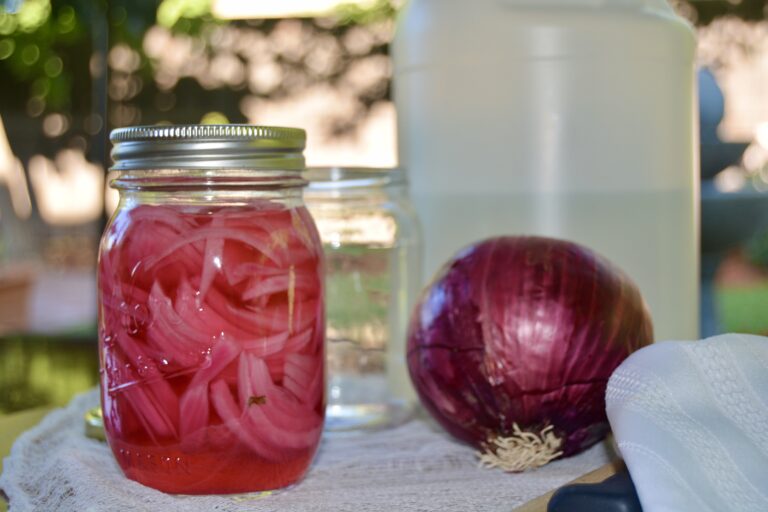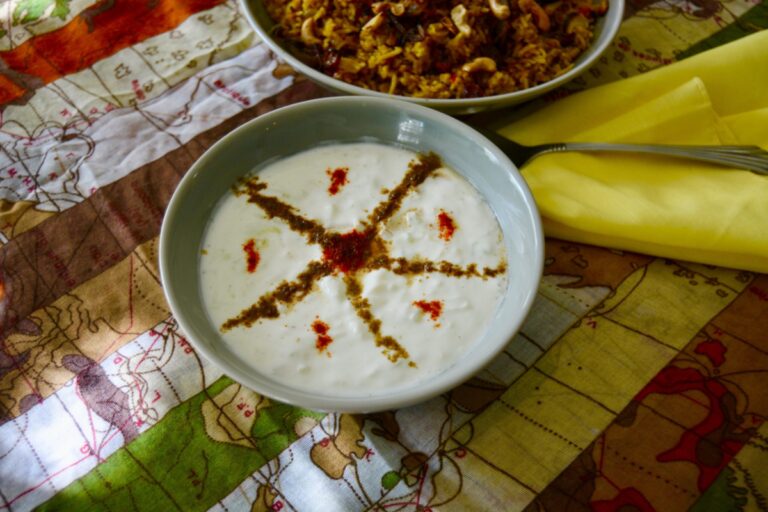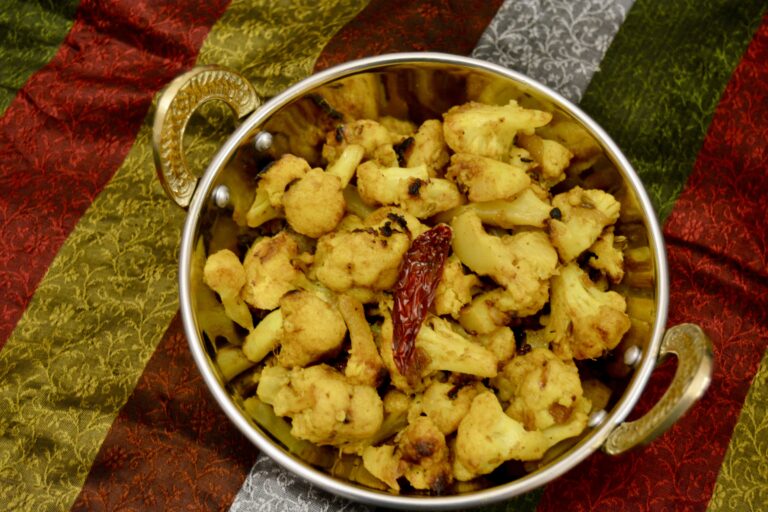It is the beginning of winter. I am curled up on the sofa reading. The trees have been stripped bare by autumn winds. It is getting close to dinner and I really do not feel like spending too much time cooking as the book is getting fascinating! I remember a very simple recipe that Mama would occasionally fix with goat/lamb liver and kidney. Since I am not much into liver or kidney, I usually fix it with chicken, but you could use beef, lamb, or goat meat. I set my book aside, and soon I am in the kitchen cutting up the chicken breast and get started. Do I miss my cooks in India? Naah! I enjoy cooking…though clean up is another story!!!
Jalfrazi, jalfrezie, jhal frezi, jaffrazi—many spellings for the same dish has its origins in Bengal. The word “Jal” means spicy in Bengali, but you can make the dish milder by adjusting the spices in the dish to your palate.
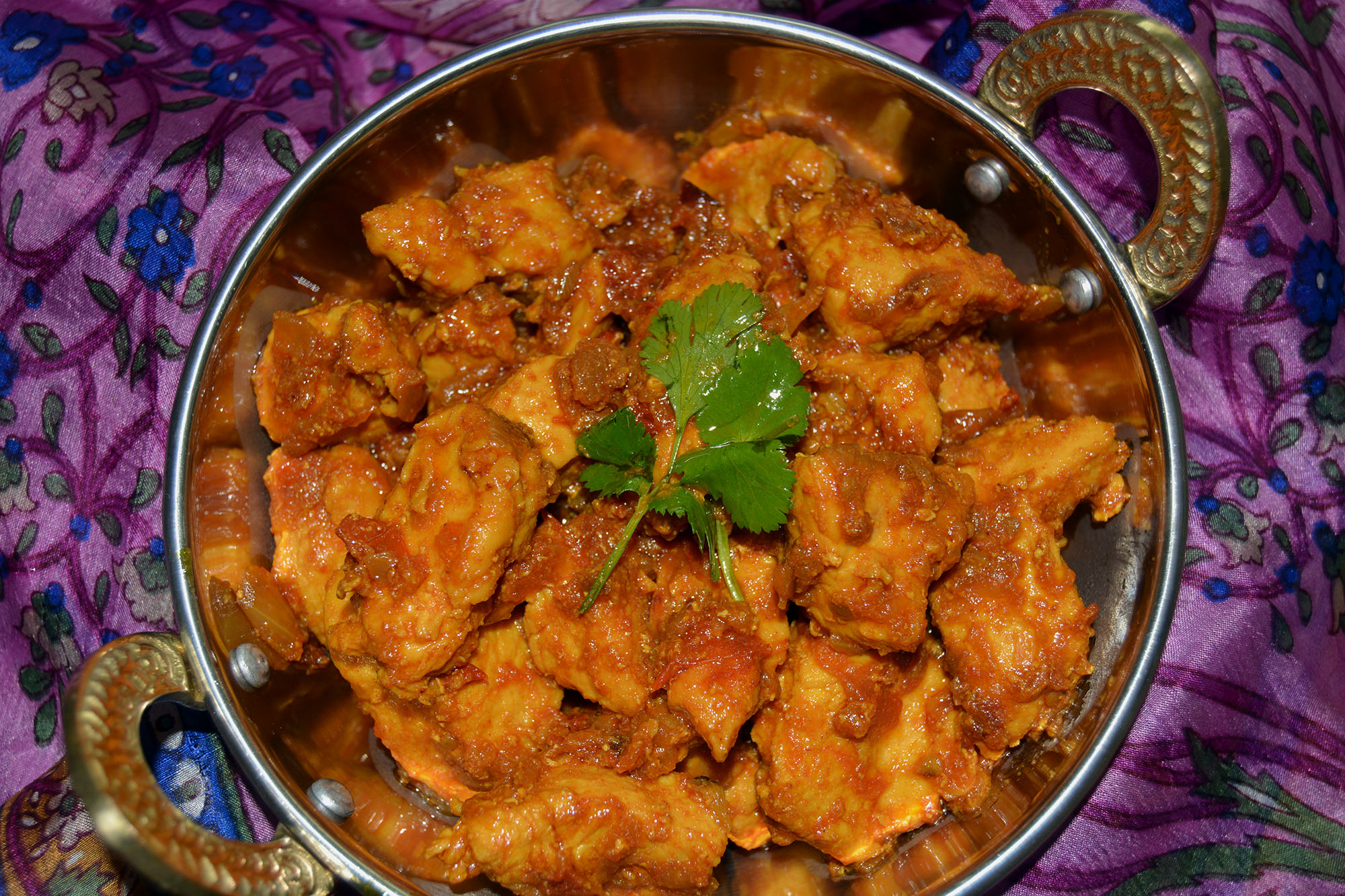
Chicken Jalfrazi
Ingredients
- 1 lb boneless chicken breast or thighs
- 2 large onions (approx. 8 oz)
- 2 large tomatoes (approx. 3/4 cup)
- 1 tsp chili powder (to taste)
- 1 tsp cumin powder
- Salt to taste
- 3 tbsp cooking oil
- Fresh cilantro for garnish (optional)
Instructions
- Heat oil in a deep pan over medium heat.
- Add onions and sauté till golden brown, approximately 8-10 minutes.
- Add the chicken, salt, chili and powders. Stir a few times.
- Cover and cook, stirring occasionally, till all the moisture from the chicken evaporates, 7-8 minutes.
- Uncover and add the tomatoes.
- Now cook uncovered stirring occasionally till the tomatoes are nicely blended.
- Add half cup hot water, stir and get all the good braised bits incorporated, then let simmer for 5 minutes to get a thick gravy.
- Garnish with cilantro.
Notes
Lassi, a yogurt drink that is common in India, is becoming popular all over the world. It is a refreshing summer drink to combat the heat. I normally just like it plain with no fruit, but once in a while, I will fix it with fruit. It is a great substitute for a light lunch or a mid-day snack. My youngest sister and her daughters love it after working out at the gym.
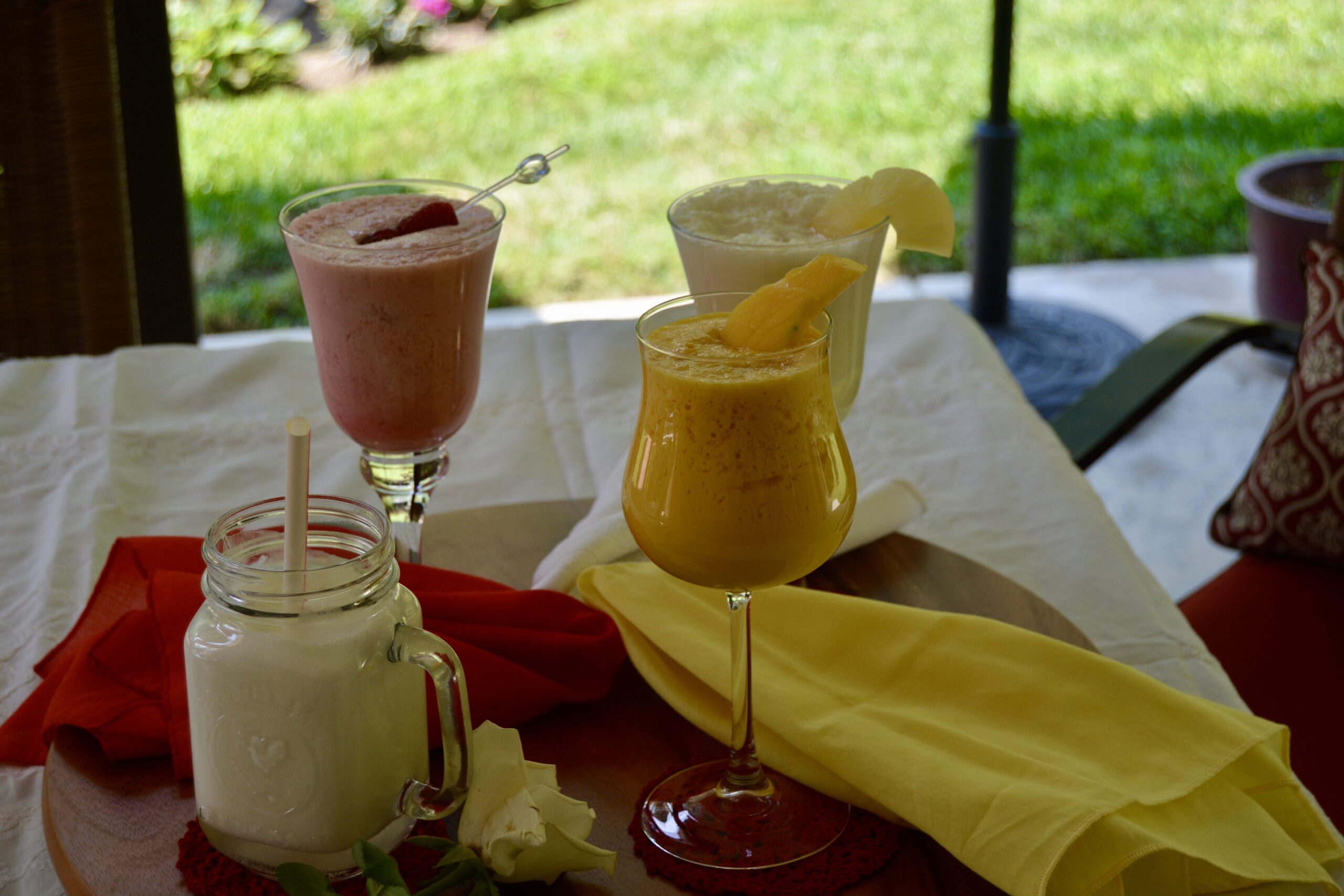
Pineapple Lassi (Pineapple Yogurt Drink)
Ingredients
- 1 cup plain yogurt (full fat, low fat, or no fat)
- 5 oz fresh pineapple (chilled, peeled, and chopped or 5 oz of canned pineapple)
- 2 tbsp sugar (depending on the sweetness of pineapple, or use sugar substitute)
- ½ cup pineapple juice (if using canned pineapple)
- 1 cup ice or ice cubes (crushed)
Instructions
- Put all the ingredients with a ½ cup of crushed ice in a blender (or hand whisk) and blend until smooth. Taste for sugar. Save the extra ice in case you want the drink colder.
- Serve in tall stemware or regular glasses, garnished with a pineapple rind, chopped pineapple, or mint leaves.
Notes
My husband has been transferred once again. This time to Agra. In true military fashion, there are no homes available for immediate occupation. We stay with a close friend and fellow officer and his wife. They have graciously allowed us to stay with them until we are allotted temporary accommodation. This was a recipe that I learned when we were with them. Thank you, Madhu!

About Agra—the city of the Taj Mahal! When I first saw it, I wasn’t that impressed as I had been fortunate to have seen so many beautiful structures all over India, old or older. And then, one moonlight night, we went to see it and suddenly its beauty and majesty sprang to light. I guess my daytime visits with teeming crowds and vendors detracted from it.
Years later, our family was able to revisit it and spend more time soaking up the intricacies of its amazing architecture and design.
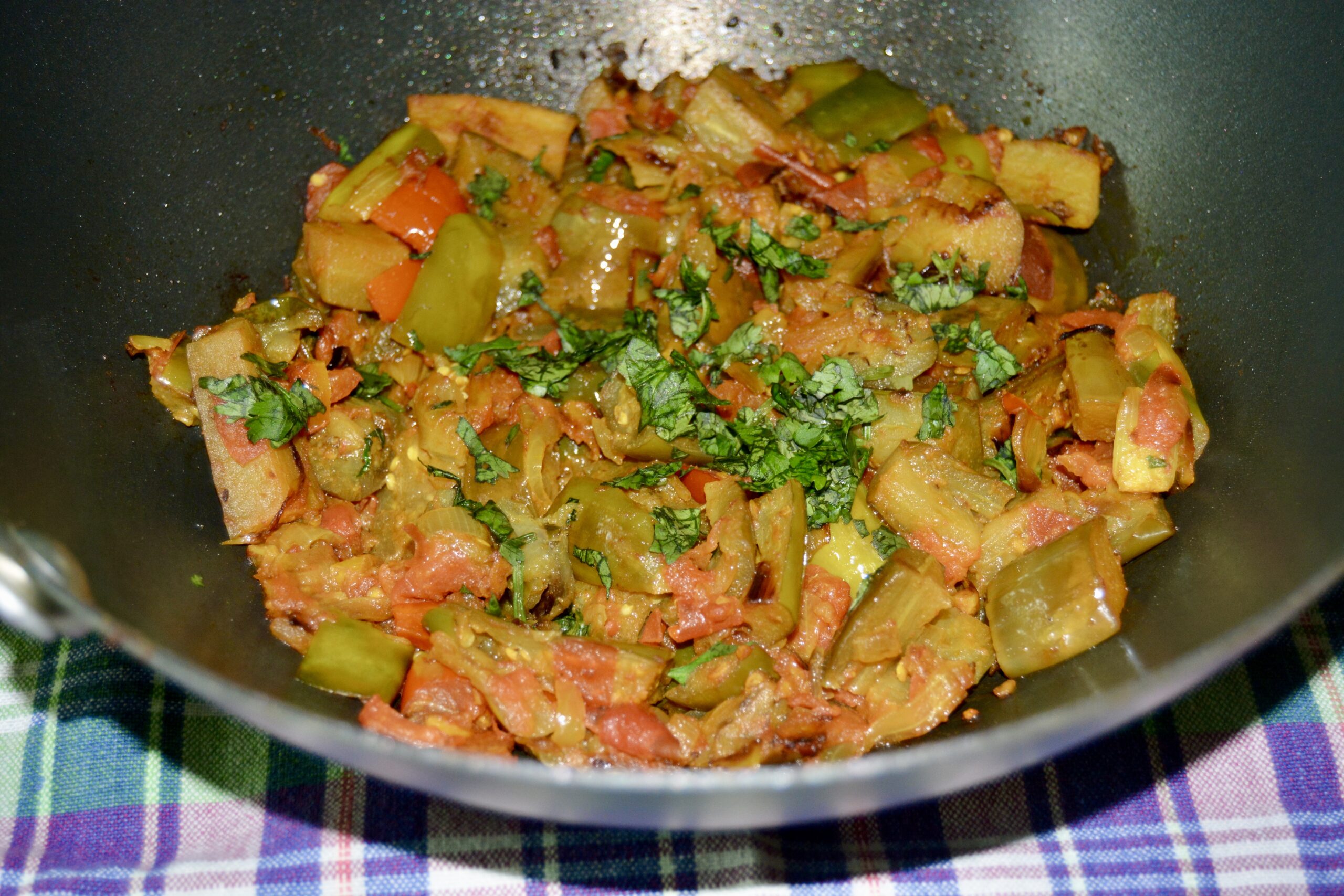
Masala Baingan (Sautéed Spicy Eggplant)
Ingredients
- 2 large long eggplants (or large oblong one. Wash and dice into one-inch cubes, unpeeled.)
- 1 tbsp fresh ginger (chopped, skin removed)
- ½ large onion (semi-finely diced)
- 2 large tomatoes (diced)
- ½ tsp tumeric powder
- chili powder (to taste or 1 green Serrano chili, finely diced)
- 4 tbsp cooking oil
- salt (to taste)
- 2 tbsp fresh cilantro, finely diced, for garnish
Instructions
- Heat oil in a wok or deep skillet over medium heat. Add chopped ginger and sauté for 30 seconds.
- Add onions and sauté for another 4 minutes until soft and starting to turn brown at the edges.
- Now add the spice powders and stir for 30 seconds to stir-fry the masala.
- Add the chopped eggplant. Stir a few times to mix the masala and the eggplant, then add the tomatoes.
- Cover and cook for about 5 minutes until the eggplants are tender. Uncover and cook on semi-low until the moisture evaporates and the oil starts to separate. Approximately 10-15 minutes.
- Be sure to stir a few times while cooking so your eggplant does not stick to the pan and burn. The eggplant should be soft, but not mushy.
- Add half the cilantro and stir to mix it in. Transfer to a serving dish and garnish with the rest of the cilantro.
Notes
-Taj Mahal Photo by AussieActive on Unsplash
A relish, plain yogurt, or pickles accompany most Indian meals. They can pick up a meal a notch or two.
You can get many varieties of relish and pickles at the Indian grocery store, so I have not bothered to fix them like I used to. However, I do fix simple condiments from time to time. Here is one of them.
Before you begin, you will need a nice clean canning bottle or a glass bottle with a tight lid.
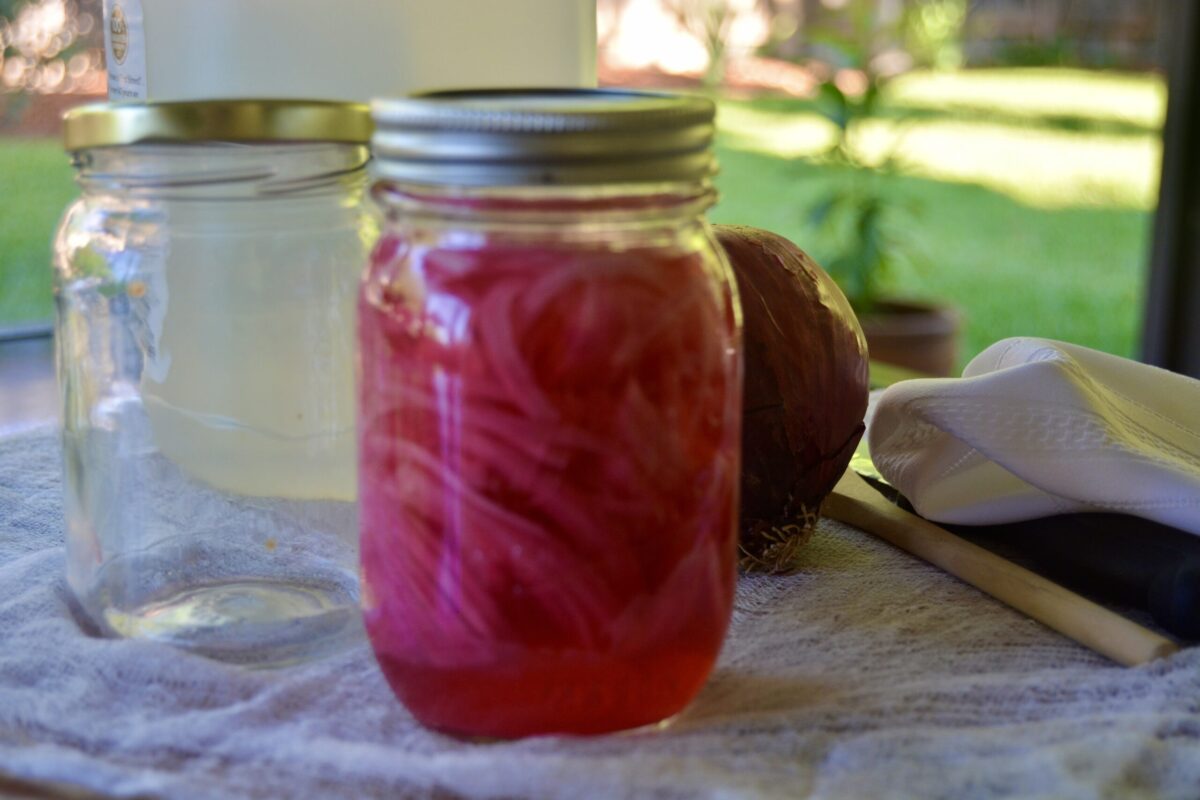
Vinegared Red Onions
Ingredients
- 1 large red onion
- 1½ cups distilled white vinegar (or malted vinegar)
- ¼ tsp sugar (optional)
- ½ tsp red chili powder (or slit green Seranno chilies, both are to taste and optional)
Instructions
- Peel and wash the onion. Wipe dry.
- Slice the onion into reasonably thin slices. Put the sliced onions into the clean glass bottle (you can also use a ceramic pickle jar) and cover them with vinegar.
- Let sit a few days, shaking the bottle every day to circulate the onions.
- They are ready to eat within a few days. The longer you keep them, the more pickled they get.
Notes
Raitas are side dishes to Indian cuisine made out of yogurt mixed with fresh vegetables or boondi (a fried snack made from chickpea flour). Sometimes, cooked vegetables are added as well. Raitas compliment a meal, especially pilafs. They also taste good with dal and rice.
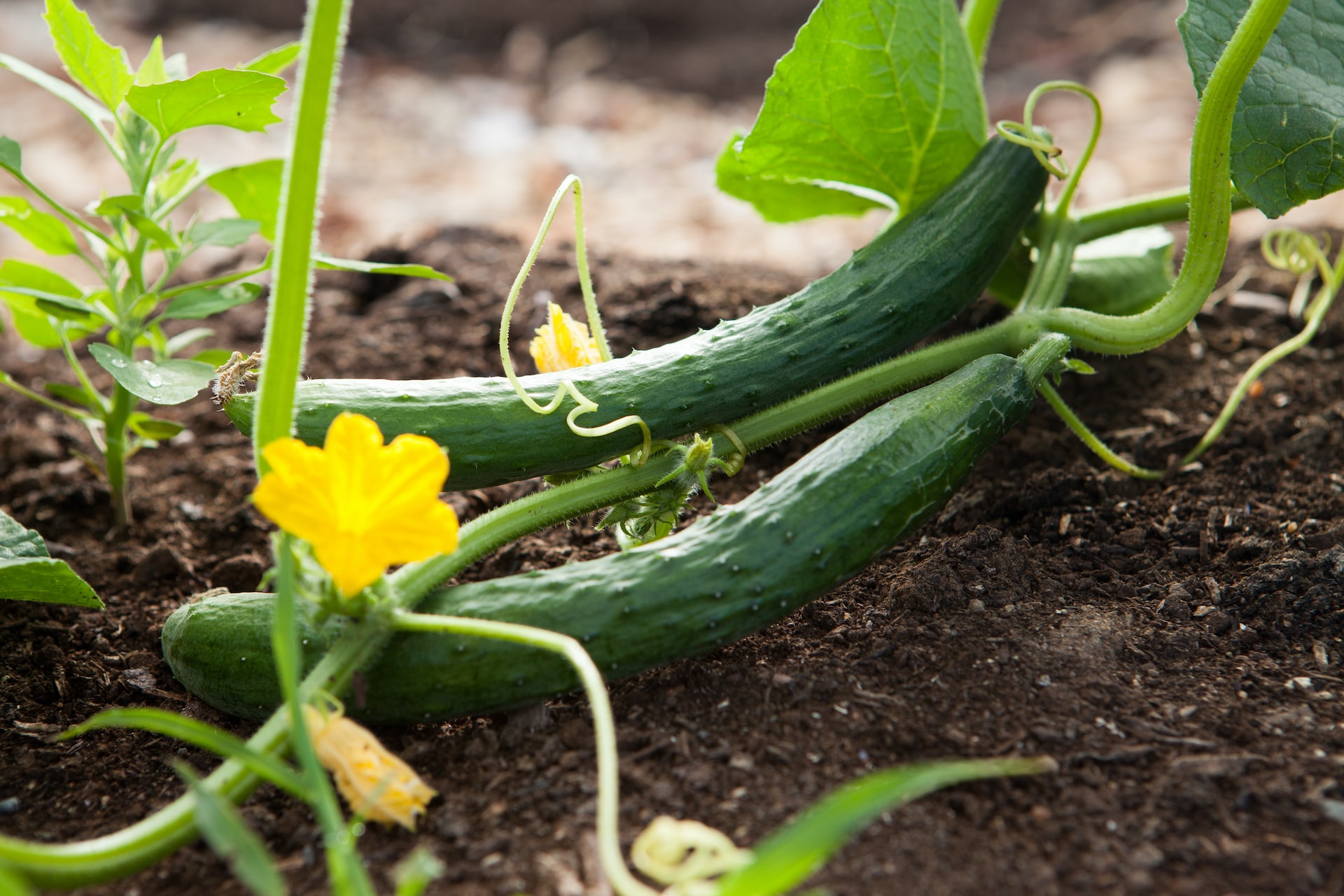
Kheera Raita (Cucumber Yogurt)
Ingredients
- 2 cups plain yogurt (nonfat, fat free, or whole)
- 1 large cucumber, peeled and grated (use the large side of the grater)
- salt and pepper (to taste)
- ⅛ red chili powder (more or less totaste)
- ¼ tsp coriander powder (roaste)
Instructions
- Whisk the yogurt until it is smooth.
- Squeeze the excess water from the grated cucumber.
- Add the cucumber to the yogurt and mix together.
- Add the salt and pepper. Mix together.
- Pour into a serving dish.
- Sprinkle with chili powder and roasted cumin powder.
- Serve as a side to any Indian meal.
Notes
I was in the grocery store about a week ago, and they had fresh large cauliflowers on sale. Tempted by the price, I decided to buy two.
A week later, the second cauliflower is still accusingly sitting in the vegetable bin! I decide it is time to cook it before it gets rotten.
There are so many ways to cook a vegetable in India. By tweaking the masalas, you can create a new exotic dish. But how can you tell if it is good? When you sit down to eat with your family, their reactions are the final test of your creation!
So looking at the second cauliflower, I decide to morph a baked cauliflower recipe I have, but instead of baking the cauliflower, I will sauté it.
Tula Hua Gobi (Cauliflower Fry)
Ingredients
To Prepare
- 8 cups water
- 1 head cauliflower
Ingredients
- 3 tbsp yogurt
- 1 tbsp ginger-garlic paste
- 1 tsp turmeric powder
- 2 tsp coriander powder
- 1 dried red chili (more or less, according to taste)
- ⅛ tsp garam masala
- ½ tsp ground or cracked pepper
- 1 tsp fennel seeds
- 1 medium onion (approximately 3 oz)
- 1 tsp salt (or according to taste)
- 3 tbsp cooking oil
- 1 tbsp fresh cilantro (chopped, for garnish)
Instructions
- Set a 6-quart pot with about 8 cups of water on medium heat and bring to boil.
- In the meantime, prepare the cauliflower. Remove the thick stem from the cauliflower. Since I am instilled with my mother-in-law’s 'no wastage' policy, I cut the thick fibrous outer portion and chop the soft inner part of the stem to add to the sabzi. (Incidentally, in India you can buy just a bundle of the stems to fix a sabzi).
- Separate the florets into bite-sized portions. Slice them in half if you have to.
- Wash the cauliflower well and add to the boiling water. Let it boil for 2-3 minutes, then drain.
- Note: If you have a microwave steamer, you can steam it for 1 minute.
To Marinate
- In a large bowl, add the cauliflower, yogurt, and spice powders, and toss well together. Set aside for 20-30 minutes.
To Season
- Heat the oil in a wok or deep saucepan on medium heat. Add the fennel seeds, stir for 15 seconds, and add the chopped onion. Sauté till half brown. Approximately 7-8 minutes.
- Add the masala-coated cauliflower and stir a few times. Lower the heat slightly. Cover and cook, occasionally stirring until the cauliflower is tender (about 7 minutes). You do not have to add any additional water while the cauliflower cooks, as it releases a lot of water during cooking.
- Uncover and cook another 3 minutes until the oil surfaces.
- Pour into serving dish and garnish with coriander leaves.

